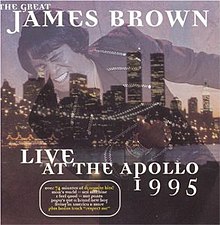
"I Got You (I Feel Good)" is a song by the American singer James Brown. First recorded for the 1964 album Out of Sight and then released in an alternate take as a single in 1965 and included on the compilation album of the same name, it was his highest-charting song on the Billboard Hot 100 and is arguably his best-known recording. In 2013, the 1965 recording was inducted into the Grammy Hall of Fame.
Live at the Apollo may refer to:

Live at the Apollo is the first live album by James Brown and the Famous Flames, recorded at the Apollo Theater in Harlem in October 1962 and released in May 1963 by King Records. Capturing Brown's popular stage show for the first time on record, the album was a major commercial and critical success and cemented his status as a leading R&B star.

"Papa's Got a Brand New Bag" is a song written and recorded by James Brown. Released as a two-part single in 1965, it was Brown's first song to reach the Billboard Hot 100 Top Ten, peaking at number eight, and was a number-one R&B hit, topping the charts for eight weeks. It won Brown his first Grammy Award, for Best Rhythm & Blues Recording.
"There Was a Time" is a song written and performed by James Brown.
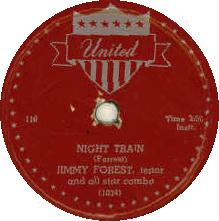
"Night Train" is a twelve-bar blues instrumental standard first recorded by Jimmy Forrest in 1951.
"Cold Sweat" is a song performed by James Brown and written with his bandleader Alfred "Pee Wee" Ellis. Brown recorded it in May 1967. An edited version of "Cold Sweat" released as a two-part single on King Records was a No. 1 R&B hit, and reached number seven on the Pop Singles chart. The complete recording, more than seven minutes long, was included on an album of the same name.
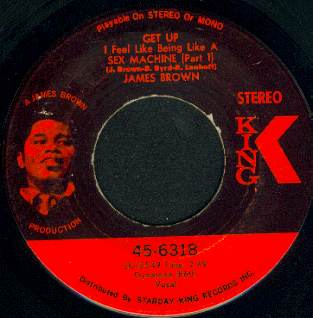
"Get Up Sex Machine" is a funk song recorded by James Brown with Bobby Byrd on backing vocals. Released as a two-part single in 1970, it was a no. 2 R&B hit and reached no. 15 on the Billboard Hot 100.
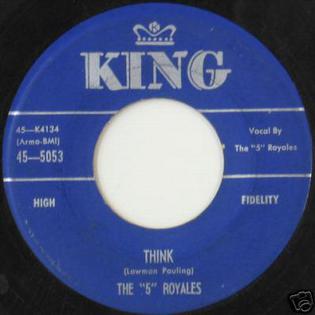
"Think" is a rhythm and blues song written by Lowman Pauling and originally recorded by his group the "5" Royales. Released as a single on King Records in 1957, it was a national hit and reached number nine on the U.S. R&B chart.

"Get on the Good Foot" is a funk song performed by James Brown. It was released in 1972 as a two-part single that charted #1 R&B and #18 Pop. It also appeared on an album of the same name released that year. Partly due to the unwillingness of Brown's record labels to certify sales of his previous hits, "Get on the Good Foot" was his first gold record. Billboard ranked it as the No. 99 song for 1972.

"Make It Funky" is a jam session recorded by James Brown with The J.B.'s. It was released as a two-part single in 1971, which reached No. 1 on the U.S. R&B chart and No. 22 on the U.S. Pop chart.

"Doing It to Death", also known as "Gonna Have a Funky Good Time", is a funk song recorded by The J.B.'s featuring James Brown. A 10-minute, two-part version of "Doing It to Death" was included on a J.B.'s album of the same name. The complete, unedited and nearly 13-minute-long original recording of the song was first issued on the 1995 J.B.'s compilation Funky Good Time: The Anthology. Performances of the song also appear on the albums Live at Chastain Park and Live at the Apollo 1995.
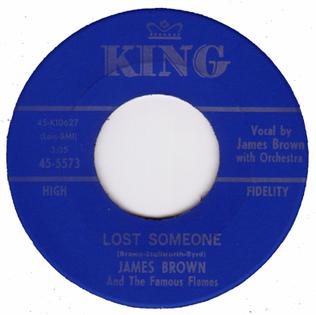
"Lost Someone" is a song recorded by James Brown in 1961. It was written by Brown and Famous Flames members Bobby Byrd and Baby Lloyd Stallworth. Like "Please, Please, Please" before it, the song's lyrics combine a lament for lost love with a plea for forgiveness. The single was a #2 R&B hit and reached #48 on the pop chart. According to Brown, "Lost Someone" is based on the chord changes of the Conway Twitty song "It's Only Make Believe". Although Brown's vocal group, The Famous Flames did not actually sing on this tune, two of them, Byrd and Stallworth, co-wrote it with Brown, and Byrd played organ on the record, making it, in effect, a James Brown/Famous Flames recording.

"Bewildered" is a popular song written in 1936 by Teddy Powell and Leonard Whitcup. It was a 1938 hit for Tommy Dorsey and His Orchestra.
"I'll Go Crazy" is a rhythm and blues song recorded by James Brown and The Famous Flames. Released as a single in 1960, it was Brown's fourth R&B hit, charting at #15. Brown and the Flames also performed it as the first song on their 1963 album Live at the Apollo.

Pure Dynamite! Live At The Royal is a 1964 live album by James Brown and The Famous Flames. Originally issued on King Records, it was the live follow-up to Brown's 1963 Live at the Apollo LP, and like that album, reached the Top 10 of the Billboard Pop album charts, peaking at #10. It was recorded live at the Royal Theatre in Baltimore, Maryland, a popular venue for R&B artists of the day. The album takes its title from Brown's most famous nickname at the time, "Mr. Dynamite".
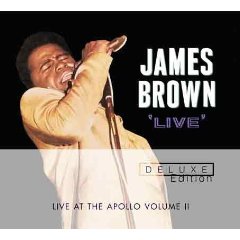
Live at the Apollo, Volume II is a 1968 live double album by James Brown and The Famous Flames, recorded in 1967 at the Apollo Theater in Harlem. It is a follow-up to Brown's 1963 recording, Live at the Apollo. It is best known for the long medley of "Let Yourself Go", "There Was a Time", and "I Feel All Right", followed by "Cold Sweat", which document the emergence of Brown's funk style. It peaked at #32 on the Billboard albums chart. Robert Christgau included the album in his "basic record library" for the 1950s and 1960s.
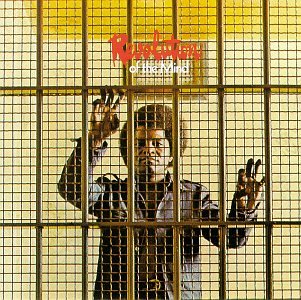
Revolution of the Mind: Live at the Apollo, Volume III is a live double album by James Brown released in 1971. As its subtitle suggests, it is Brown's third album recorded at the Apollo Theater, following the original Live at the Apollo (1963) and Live at the Apollo, Volume II (1968).
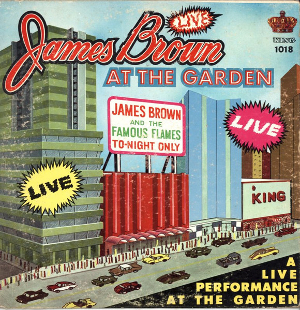
Live at the Garden is a 1967 live album by James Brown and The Famous Flames. It was recorded on January 14, 1967 in the middle of a ten-day engagement at the Latin Casino in Cherry Hill, New Jersey - Brown's first at an upscale nightclub. Like most of Brown's live albums, overdubbed crowd noise was added to the original recording for its LP release. It included one new song, "Let Yourself Go", which was recorded after hours at the casino; it appeared on the album disguised as a live recording. Although Live at the Garden peaked at #41 on the Billboard album chart, it came to be overshadowed in Brown's catalog by his next live album, Live at the Apollo, Volume II, recorded later the same year and released in 1968.
"Let Yourself Go" is a 1967 song by James Brown.
